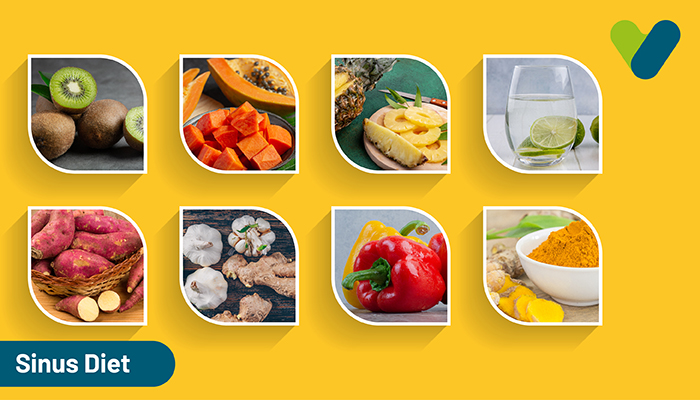Sinusitis has multiple causes. However, understanding which foods might trigger or reduce the inflammation can provide you with relief from sinusitis symptoms. Sinusitis, whether acute or chronic, is an inflammation of the tissue lining the sinuses. The most common ailment is acute sinusitis, which entails severe discomfort and typically resolves in a few weeks. Chronic sinusitis is characterised by symptoms that persist for several months and, in some cases, return more than once a year. Inflammation in the sinuses is commonly caused by a virus, but it can also be caused by bacteria and allergies, which can last longer.
Regardless of the cause or severity of the infection, it is necessary to be careful with the foods you consume. The right foods can enable faster recovery, but certain foods can lead the sinuses to become swollen and congested.
The following are foods for sinus, or food habits that can help enable faster recovery from sinusitis:
- Stay hydrated In addition to affecting the body's immunity, dehydration causes mucus to thicken. Thick mucus obstructs the sinuses, creating ideal circumstances for bacterial development and inflammation. It is essential for the body and nasal cavity to consume plenty of water. Drink warm water and add a dash of lime as a daily morning ritual on an empty stomach, which will go a long way in boosting your immunity against all infections.
- Add more antioxidants Chronic sinusitis disease is influenced by free radicals, which are combated by antioxidants. Additionally, they shield the mucous membrane. Berries, kiwis, pumpkins, papayas, sweet potatoes, and pineapple are among the colourful fruits and vegetables that are rich in antioxidants, vitamins, and minerals. In addition, pineapple contains enzymes that reduce inflammation and eliminate nasal congestion.
- Include peppers Peppers alleviate nasal congestion and facilitate mucus flow by softening it. Hot chillies and peppers contain capsaicin, which helps reduce sinus issues or inflammation, strengthen the immune system, and ease away pain. Peppers cannot treat sinusitis, but they can significantly reduce congestion. However, exercise caution while consuming spicy foods, as they might cause indigestion and gas.
- Don’t forget turmeric, ginger & garlic Garlic contains a sulphur compound with potent antibacterial and antifungal properties, as well as antiviral and anti-inflammatory properties. Ginger's anti-inflammatory and antioxidant qualities also speed the healing process and reduce pain and swelling. Additionally, the antihistamine effects of ginger can help with allergies, discomfort, and sinus problems. Turmeric may also be utilised because it delivers the same benefits as ginger.
Foods To Avoid With Sinusitis
Here is a list of foods you can avoid if you have sinusitis.- Refined sugar Avoid processed sugar, which stimulates inflammation and as they are foods that cause sinus problems. Favourite treats including pastries, chocolate bars, sodas, and fruit juices all include processed sugar, which is also known as fructose or sucrose can enhance build-up of mucus in the body.
- Oily foods Pizza, cheese, meat products, pasta dishes, dairy products, and grain-based sweets have high levels of saturated fat that can cause inflammation in the fat tissues are among the foods to avoid with sinus infection. Also, skip fried foods as they can aggravate your throat and trigger cough.
- Sodium Monoglutamate (MSG or ajinomoto)
- Gluten Limit your intake of foods that are high in gluten. Gluten is present in foods made from wheat, rye, and barley, which can cause congestion and bacteria build-up. Avoid gluten if you have a sinus infection.
- Refined & processed foods Your inflammation can be caused by refined carbohydrates like processed white flour products, sugar, and cereals, which triggers more mucous in the body.
- Alcohol Alcohol use might exacerbate sinusitis symptoms, including nasal congestion. Dehydration and inflammation are both effects of alcohol. It also has ingredients that triggers swelling in the nasal tissues. Therefore, if you are prone to sinusitis, minimise alcohol consumption.
- Dairy & curds The sinus mucus becomes thicker with milk and other dairy products. Stay away from whole dairy and dairy products to stop the mucus from thickening. Also, avoid consuming curds or foods that contain curds, especially at night, as it is known to aggravate mucous glands that can increase sinusitis symptoms like cold, stuffy nose and acute cough.
- Tomatoes
Meat contains a lot of protein. The body can accumulate the protein as mucus, which can aggravate sinusitis symptoms.
